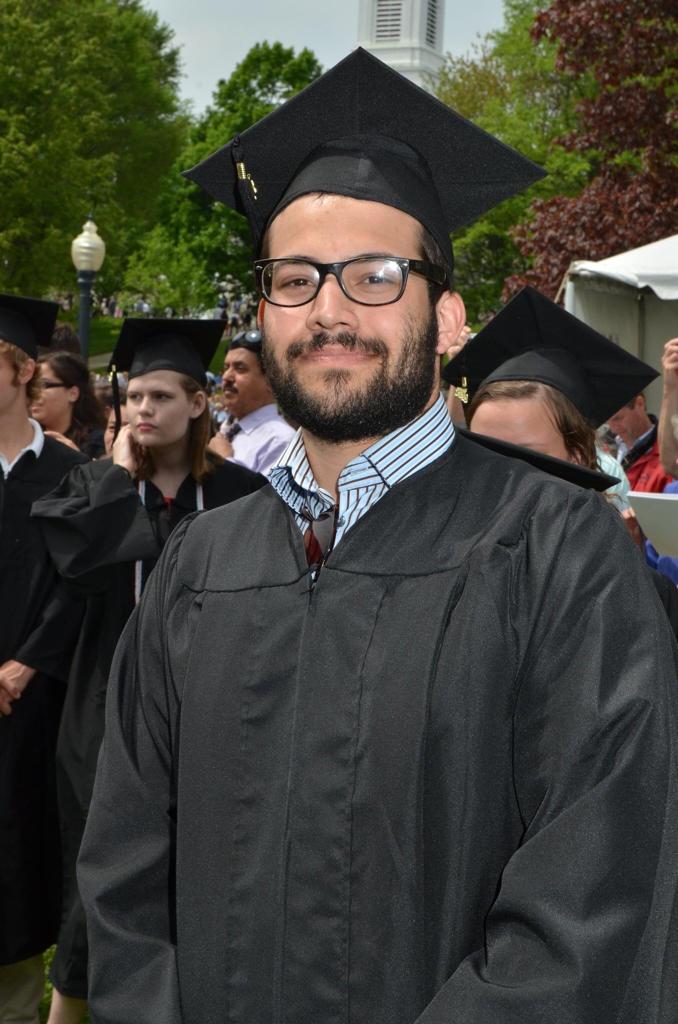
Current NER summer intern Simone Edgar Holmes ’20.5 talks to Juan C. Machado ’11, former NER intern and current data analyst in Los Angeles, about his experiences at NER and his journey since.
Juan Machado (left) at his graduation from Middlebury College in May 2011.
Simone Edgar Holmes: When were you an intern at NER and what are a couple of things you remember doing here?
Juan C. Machado: I was an intern at NER during the summer of 2010. That was a time of significant change at NER. For example, we still received dozens of thick manila envelopes each day containing submissions, and I think we were considering if and how we should accept online submissions. That was also when NER stepped up its reading series and started to hold events in Middlebury and elsewhere more frequently. At one point, I represented the journal at a literary fair held at Housing Works in SoHo.
SEH: Where are you now, geographically and professionally?
JM: I live in Los Angeles now. I have recently finished a master’s degree in public policy at the University of Southern California and I have started working for a group that advises progressive organizations and campaigns on electoral programs.
SEH: What were some of the steps in between Vermont and LA?
JM: After Middlebury, I lived in New York for nearly seven years and worked in communications. Before moving there, I remember asking Professor Bertolini, a Brooklynite, where I could go to watch films like those we had seen in his American Drama class. He recommended the Brooklyn Academy of Music, and that became my second home in New York. It was equidistant to my office and my home and, after work, I would generally walk there and watch whatever they had on before heading home.
SEH: Is there anything you learned from your time at NER that has come to bear on your current work?
JM: I would think that most people imagine the office of a literary magazine as a place stuck in a different era, a blur of dust and tweed. Nothing could have been more different at NER. The Middlebury administration had pushed NER to become more financially sustainable and there was a start-up vibe as we constantly looked for ways to increase revenue and readership. I hadn’t thought of the internship as an apprenticeship in business and marketing, but that was certainly a component. Being a working environment so receptive to new ideas, even from interns, encouraged me to speak up in future roles and to know that I can actively contribute.
SEH: Have you read any good books lately?
JM: I’m currently reading Set the Night on Fire, a history of Los Angeles in the 1960s by Jon Wiener and Mike Davis. I find that as a relative newcomer to Los Angeles, it’s important to understand the city’s history. It’s amazing how events from that decade, like extreme segregation by real estate developers and the approval of Proposition 14 against fair housing, have shaped the issues that haunt the city today, from homelessness to the distrust between communities of color and the LAPD.
I also recently finished Upton Sinclair’s The Jungle. It was on my list because it is often the example of a book that moved public opinion and, ultimately, policy. After reading it, I found it interesting that the after-publication public uproar exclusively focused on food sanitation and not the living and working conditions of low-wage immigrants. Sinclair certainly has vivid descriptions of the sanitary conditions of meatpacking plants, but the bulk of his work details issues like wage theft, workplace harassment, and job insecurity.
SEH: Thank you for your recommendations and your insights, Juan!